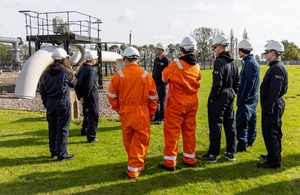Royal Engineers lead training effort to help Ukraine defend its critical national infrastructure
Ukrainian civilian engineers have received training in the UK to learn techniques to protect critical infrastructure from Russian drone and missile attacks

Ukrainians receive training from the Royal Engineers at a gasworks in England
British Army Royal Engineer specialists have delivered a new programme of training to help Ukraine strengthen its ability to protect its critical national infrastructure (CNI) from Russian attacks and save civilian lives this winter.
Damage and destruction of CNI by Russian missile and drone attacks represents one of the greatest threats to the lives and safety of Ukrainian civilians following Putin’s illegal invasion.
The training will improve Ukraine’s ability to plan the defence of its CNI from such attacks, with trainees instructed how to identify the most vulnerable elements of CNI, potential blast ranges and impacts of different weapons and explosives, and where best to locate physical and aerial barriers to help protect these sites from Russian attacks.
Defence Secretary Grant Shapps said:
It is essential that Ukraine receives the support it urgently needs throughout the winter, as its civilian population faces mortal danger on a daily basis from Putin’s forces and their indiscriminate campaign of bombardment against its critical infrastructure.
The Ukrainian people have demonstrated unwavering resilience in the face of this illegal invasion and this tailored package of training will help save lives during the bitterly cold winter months, where access to reliable energy is of vital importance.
The two-week training package was developed and delivered following a request from Ukraine to further improve the protection of its energy sector and has already progressed in complexity from earlier courses focused on basic protection measures, such as use of sand bags and entrenchment.
Defence Secretary Grant Shapps recently announced a new package of support for Ukraine, procured through the International Fund for Ukraine, to provide £100m in capability to provide maintenance and manoeuvre support – including heavy duty plant vehicles to help shore up Ukraine’s defensive infrastructure. The UK also hosted the Ukraine Recovery Conference this year, where new support was announced including a £45m funding boost for Ukraine’s energy recovery.
Bringing together Ukrainian professionals from across the energy, water, transport, and academic sectors for the CNI protection training meant they could share knowledge and past experiences which ultimately will increase the resilience of the CNI network.
Major Michael Suddaby, from 63 Works Group Royal Engineers, said:
There is no doubt this training will be implemented in Ukraine in the coming weeks and have a real-life impact on the quality of life of its civilians and the ability for Ukraine to resist Russian attacks throughout the winter.
The Ukrainian participants were extremely motivated and will be able to apply the specialist force protection measures and the infrastructure assessment methods delivered on this course to support their country.
The Royal Engineers have drawn on specialist reservists, who work within the UK CNI sector and have employed their professional experience and technical knowledge to deliver elements of the training at a UK gasworks, military airstrip, and a port facility.
This is built upon experience from deployments including to Bangladesh to assess flood damage and Nepal to assess earthquake damage. The course drew on several real-life scenarios to provide Ukrainian participants with opportunities to practice plan development and implementation of practical solutions to provide their CNI facilities with the most efficient protection.